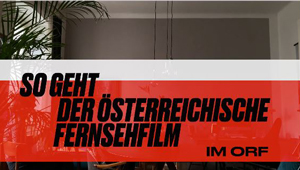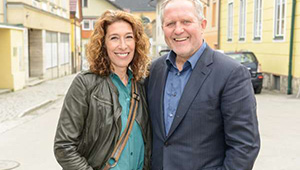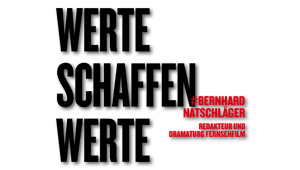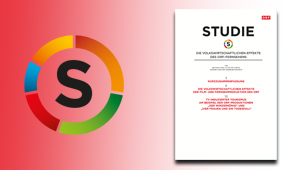Back to overview
04 | APRIL - Added value
Who are we? - Katharina Schenk, television film
There is something like a cinematic identity. It is something that we may not be able to put into words, but that we feel collectively when we watch Austrian films and series. It is something unifying that manifests itself, a deep true core, part of it mentality, part of it shared history, part of it social space. But we feel: it is something that stands apart from everything else. Never before has the fictional realm been more about identity than it is now. The market has become almost unmanageable, and so have the offers to the audience. It's not the general, the uniform that gets ahead - it's what is sure of itself that gets ahead, stories that know what they are, where they come from and what they want.
Identity is the answer to the question of who you are. This realization is a process, a path that we walk together with the creatives, which extends over years and quite a few projects. Think of Andreas Prochaska, who took his first steps as a director with "Kommissar Rex" and has perfected an unmistakable and internationally sought-after signature via "Tatort", "Landkrimi", "Spuren des Bösen", major historical productions such as "Maximilian" and "Sarajevo" to cinema hits such as "In 3 Tagen bist du tot" or "Die unabsichtliche Entführung der Elfriede Ott". One thinks of Catalina Molina, who after short film beginnings was able to develop her clear and strong cinematic voice through her work on the "Landkrimis", among others. Or Mirjam Unger, whom the ORF brought from the cinema into the world of TV series, where she directed "Vorstadtweiber" alongside Harald Sicheritz and was subsequently able to develop her very own identity in the new series "Tage, die es nicht gab".
Identity has a lot to do with truthfulness. You can only tell the story truthfully if you don't have to completely submit to external constraints. This is one of the framework conditions that ORF must offer creative filmmakers. This is especially true for authors. Giving them the opportunity to pick up on social developments, to tell history from new angles, to break up narrative traditions, to break taboos, or simply to tell the stories of people today - that is the task of ORF. This is how, for example, the sensational works of David Schalko, from "Braunschlag" to "M" were created; this is how Marvin Kren was able to narrate his "Freud"; this is how both the serial first works "Janus" by Jakob Groll and Sarah Wassermair and the "Alles finster" by newcomer author Selina Kolland, which was completed this year, were created.
Identity, however, is not only to be seen in terms of creative power. Identity has a culturally specific dimension. Taking cultural change into account is also the task of ORF. When we say today "ORF. Like us.", it must mean that we portray our society as diverse and multifaceted as it is. Here, we are taking very concrete steps in the fictional area, aware of the great responsibility we bear - and the existing need to catch up.
Ultimately, films and series from Austria should always answer the question: Who are we? That's a criterion in the search for material, it's the compass when working with filmmakers in this country. And it is important that we continue to create the framework conditions so that this question can be approached artistically from all sides, precisely because it is sometimes unpleasant to look the truth in the eye. I remain inclined to believe that self-knowledge is the first step to improvement.
________________________________________
VALUE CREATION
ORF Act
§ 10. (8) As a cultural broadcaster, the Austrian Broadcasting Corporation is to be both a reporter and an independent producer and, above all, a client, employer and forum of Austrian creativity and contemporary art. ________________________________________
Termine im April
| Fr |
1. |
1. April-Tag
|
| Sa |
2. |
Beginn des Fastenmonats Ramadan
|
| So |
3. |
Welt-Party-Tag
|
| Di |
5. |
Start: Diagonale Filmfestival
|
| Fr |
8. |
Fußball-WM der Frauen 2023 / Quali.
|
| Sa |
9. |
Eröffnung der Osterfestspiele 2022
|
| So |
10. |
Präsidentschaftswahl Frankreich
|
| Di |
12. |
ORF2: "Thema" |
| Mi |
13. |
FM4: "Bonustrack" |
| Do |
14. |
Gründonnerstag / Vaisakhi
|
| Fr |
15. |
Karfreitag / Pessach |
| So |
17. |
Ö3-"Musikfeiertag" |
| Mo |
18. |
ORF-B: Nachhaltigkeitsschwerpunkt
|
| Mi |
20. |
Österreich vom Feinsten |
| Do |
21. |
Ridván-Fest |
| Fr |
22. |
FM4: "Jugendzimmer"
|
| Sa |
23. |
St. Georgsfest (serbisch: Durdevdan) |
| So |
24. |
Ostersonntag (orthodox) |
| Di |
26. |
Jahrestag: Katastrophe v. Tschernobyl
|
| Mi |
27. |
Jom haScho'a |
| Do |
28. |
Küsse deinen Partner-Tag |
| Sa |
30. |
Walpurgisnacht |
Aus dem Public Value Archiv:


© ORF
Das Risiko zu Scheitern
Barbara Eder, Filmregisseurin


© ORF/Hubert Mican
Wenn das Tatort-Team kommt
ECO - Wertschöpfung durch den ORF


© ORF
Werte schaffen Werte
#Bernhard Natschläger, Redakteur und Dramaturg Fernsehfilm


© ORF
Studie 2012: "Volkswirtschaftliche Effekte des ORF-Fernsehens"
Matthias Firgo, Oliver Fritz (WIFO), Gerhard Streicher (Joanneum Research)
Public Value als Wertschöpfungsbegriff
Univ.-Prof. Mag. DDr. Matthias Karmasin, Institut für Medien- und Kommunikationswissenschaft an der Universität Klagenfurt



